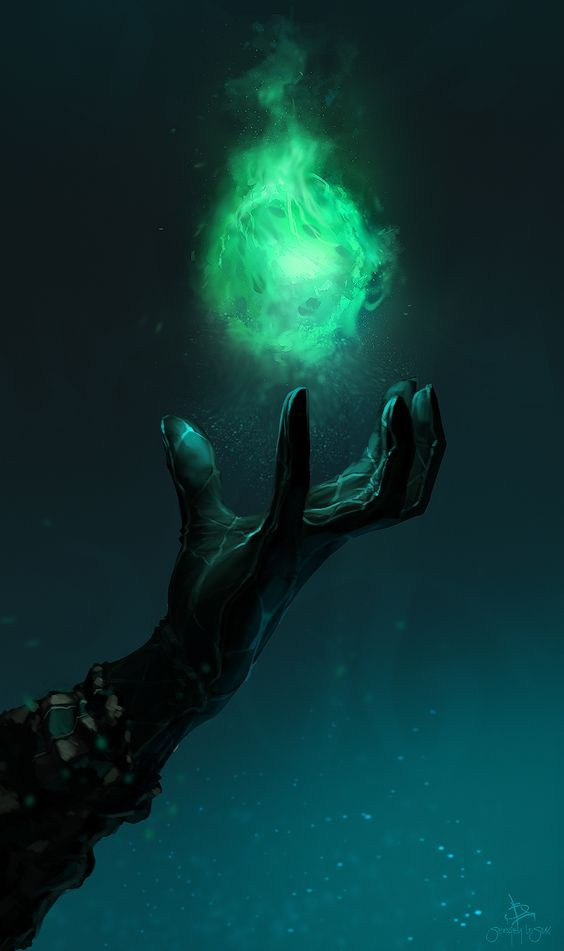
Breajelon is a world of loose magic. Some creatures learn to control and channel the force of magic to their own behalf, to form and unleash powerful spells, but also it sometimes emerges into the world, manifesting magical items or environments without the control of a creature.
For those who understand how to use magic, it empowers them to alter, defend or attack the world around or creatures within.
For others, while being pervasive, it is mysterious, supernatural and frightening.
Overview
Accessing the weaves of magic in the world surrounding an individual causes a spellcaster to get exhausted. According to his or her training, simpler spells take less then much more complex spells. A caster can even try to weave magic much higher then he or she was trained for .. coming with a high personal risk.
Characters may cast any spell from their list of spells at any time, regardless of level.
Spell Points replace Spell Slots as the resources used by casters, and provide a safe way to cast spells.
A spellcaster’s Prowess determines the level at which spells may be cast using spell points.
Spells cast at a level higher than a spellcaster’s Prowess must be Channeled. Channeled spells take longer to cast, and risk causing Drain.
Spell Points & Prowess
This system does not deviate from established norms that players and DMs will be familiar with. The resources explained here (Spell Points and Prowess) are direct translations of pre-existing mechanics. Spell points fuel spells in place of spell slots, while Prowess is designed to mimic the progression of vanilla spellcasters and their access to new tiers of spells.
Spell Points
Spell Points act as a pool that casters draw from to cast their spells. Each spell has a point cost based on its level. When casting a spell, subtract the spell’s cost from your Spell Points. Spell Points are restored after completing a long rest.
Spell Point Cost, By Spell Level:
Level Point Cost
1st 3
2nd 4
3rd 6
4th 8
5th 10
6th 12
7th 13
8th 14
9th 15
When gaining levels, a spellcaster’s pool of spell points
increases by an amount dependent upon their class
and spellcasting modifier, represented as:
Bard, Cleric, Druid, Sorcerer, Wizard:
Spell Points Gained = ( 4 + Spellcasting Ability Modifier )
Paladin, Ranger, Warlock:
Spell Points Gained = ( 2 + Spellcasting Ability Modifier )
Fighter, Rogue:
Spell Points Gained = ( 1 + Spellcasting Ability Modifier )
Prowess
Not all spells may be cast using spell points—only spells of a level equal to or less than a caster’s Prowess. Prowess represents a character’s ability to safely handle magical power, and is represented as:
Prowess = ( Spellcaster Level ÷ 2, rounding up )
Spells whose level exceeds a character’s Prowess must be cast by using a process called Channeling.
Channeling & Drain
All casters may engage in the art of channeling ripping raw energy out of the fabric of reality itself—to cast their spells. Channeling spells provides access to powerful magic that would be otherwise inaccessible to casters who have not reached a certain level under the basic rules… at the cost of heightened risk.
If the spell is cast as a ritual (ritual rules fully apply, except known and prepared spells), trying to cast spells with powerful magic, the character is not yet fully trained for also takes much more time and in addition adds a high risk for self defect.
Channeling
Channeling a spell takes time. When channeling a spell, add one Action to the spell’s casting time for every level by which its level exceeds the caster’s prowess:
Cast Time Increase (In Actions) =
( Spell Level – Caster’s Prowess )
If a caster’s prowess matches or exceeds the spell’s level, simply add one action to the spell’s cast time.
Ritual Cast Time Increase (In Minutes) = 10 * 2 ^ (Spell Level – Casters Prowess)
Drain
In addition to the time cost of channeling a spell, a caster may also suffer drain. For every round in which a spell is channeled, there is a 15% chance of suffering drain. This effect is cumulative. For instance, when channeling a spell for three rounds the caster would have a 15% chance of suffering drain on the first round, a 30% chance on the second, and a 45% chance on the third—up to a maximum of 90%.
Chance for draining in ritual casting follows the formula = 15% * (Spell Level – Casters Prowess) up to a maximum of 90%.
Drain has a two-fold effect. First, the caster gains one level of exhaustion, up to a maximum of 6. For information about the rules and effects of exhuastion, see the 5e Player’s Handbook (Page 291). Second, the caster suffers 1d4 points of psychic damage.